Category: Sin categorizar
EMERGENCY TERMINA BUILT BY QUIPORT MADE IT POSSIBLE TO RESUME CONNECTIONS WITH MANTA
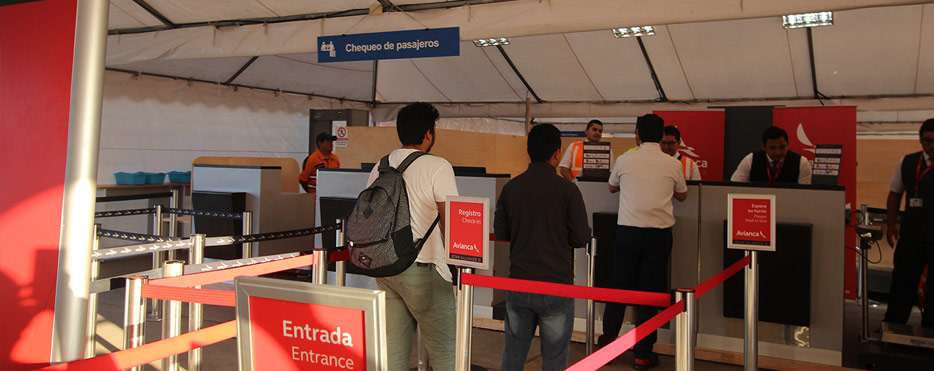
The city of Manta lost contact via air with the rest of the country after the 7.8° magnitude earthquake of April 16 that hit Ecuador and damaged the Manta’s Eloy Alfaro Airport passenger terminal leaving it unable to be used for commercial flights. It was vitally important to recover that connection in order to face the emergency in the country’s North-Center Coastal region that was devastated by the earthquake and, especially, to allow the city to begin normalizing its activities.
Flights were resumed thanks to an emergency passenger terminal built by Corporación Quiport – the Mariscal Sucre Airport concessionaire – in coordination with the Civil Aviation Directorate (“DGAC”) and Avianca’s support as a means to help the country to overcome the emergency.
Quiport and the Mariscal Sucre Airport have been providing their valuable cooperation during the emergency by coordinating flights carrying aid, rescue workers, doctors and volunteers from Quito to the areas hit by the earthquake and also coordinating flights coming from abroad with donations. “However, we wished to help even more efficiently, and that is why we identified that our contribution would be the rehabilitation of the Eloy Alfaro Airport so that it could once again handle regular commercial flights as soon as possible and, thus, resume that city’s connection with the rest of the country. We felt, as airport professionals, that this was our duty”, Andrew O’Brian, CEO of Corporación Quiport explained.
A team of Quiport engineers and technicians traveled to Manta to perform an initial evaluation to implement the project. Once the requirements were determined, a plan was submitted to the DGAC and approved by the authority.
Nine Quiport technicians traveled to Manta on April 22 to build the project during one single weekend. The first step was to bring electric power as well as a communications system to the site. Then the tents that would house the terminal areas were set up and the same equipment – that fortunately was intact – from the damaged terminal was used.
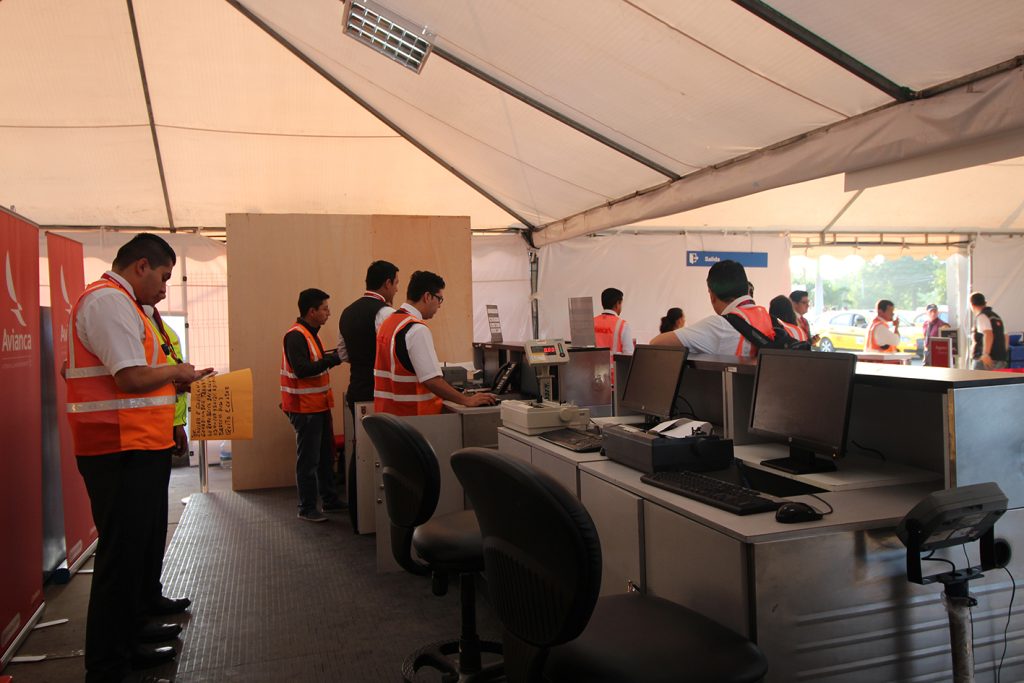
The emergency terminal is now located on a platform adjacent to the building that was affected by the earthquake. It offers basic infrastructure for passenger arrivals and departures, airlines check-in facilities, screening controls, and boarding and baggage delivery areas.
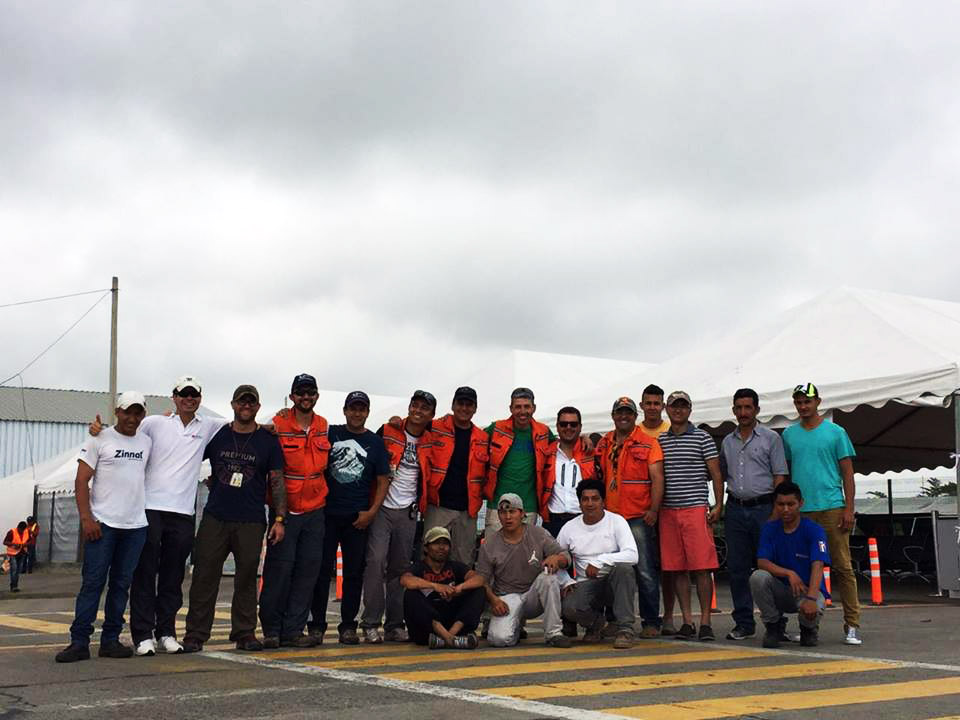
Once the emergency terminal was ready, it was delivered to the DGAC on April 24 so that it could start operating immediately. Adriano Zambrano, the DGAC Airport Administrator in Manta, was pleased with the result and highlighted the importance for Manta to have regular commercial flights once again.
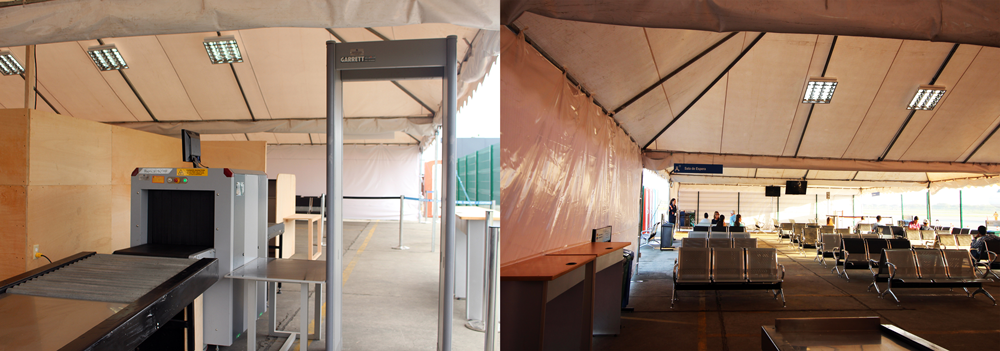
Manta’s emergency terminal began to operate on Monday, April 25, until a medium and long term solution can be designed in order to recover the infrastructure affected by the earthquake – one of the most devastating in Ecuador’s recent history.
SKYTRAX DISTINGUISHES MARISCAL SUCRE AIRPORT AS THE BEST REGIONAL AIRPORT IN SOUTH AMERICA
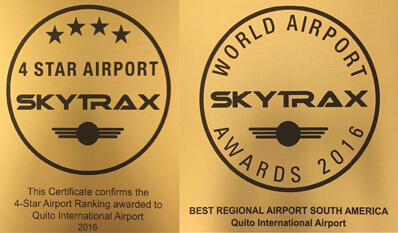
- Additionally it was placed sixth on a global scale in the category of 5 to 10 million passengers per year.
- It received four stars for the high standards of quality offered to its users and passengers.
- It also obtained prominent positions in several other categories.
Quito, 18 March 2016. Mariscal Sucre International Airport has been declared as the Best Regional Airport in South America in 2016 by Skytrax at the World Airports Awards 2016, at a ceremony held in Cologne, Germany on 16 March 2016.
The Skytrax World Airport Awards are the most prestigious accolades for the airport industry voted by passengers in the largest, annual global airport customer satisfaction survey. The awards are based on 13.25 million survey questionnaires completed by 106 different nationalities of airline customers during the survey period. The survey operated from June 2015 to February 2016, covering 550 airports worldwide and evaluating traveller experiences across different airport service and product key performance indicators – from check-in, arrivals, shopping and security to immigration. The Skytrax World Airport Awards are a global benchmark of airport excellence.
The Best Regional Airport category includes airports that do not function as a hub, as is the case of Mariscal Sucre Airport.
In addition, Quito´s airport is placed 62nd in the global ranking of airports published by the organization; sixth in the category for Best Airports: 5-10 million passengers per year; seventh among the Most Improved Airports, and third in the Best Airport Staff in South America category.
A four star airport
A team of auditors from Skytrax visited the airport in November 2015 to evaluate all services at the air terminal geared towards the passenger experience including signage, flight information, transport, parking, cleanliness, seating, lighting, digital information channels, baggage area, boarding gates, bathroom availability, airline check-in area, commercial offering and VIP lounges.
As a result of the audit, Mariscal Sucre Airport obtained a four star rating on a five-star scale. Skytrax awards the four star rating to airports that deliver a service with high standards of quality to its users and passengers.
The report prepared by Skytrax highlights areas such as parking services, availability of seating in departure lounges and public halls, banking and currency exchange facilities, flight information, check in and commercial offering. But areas that clearly stand out are the cleanliness of the terminal, free Wi-Fi service and comfort of the Domestic and International VIP Lounges.
It is worth noting that Quito Airport and El Dorado Airport in Bogota are the only airports in the Latin America and Caribbean region to have obtained the four star rating. This recognition places us in the same category as important airports such as London Heathrow Airport, San Francisco Airport in the USA, Paris Charles de Gaulle, Shanghai International Airport in China, among others.
The industry rewards high quality services
“This is a double honour (Best Regional Airport in South America and a four star rating) that fills us with pride. The results of our focus on passenger service are clear. Travellers who pass through Quito Airport appreciate the quality of service that they receive and this is recognised by the key players in the air transport industry”, stated Andrew O’Brian, President and Director General of Corporación Quiport, the airport concessionaire.
In effect, Mariscal Sucre Airport has been rewarded by both the passengers and the industry, demonstrating a consistently high level of service. What is the ideal formula? Andrew O´Brian explains that in addition to the view of service coming from the management of the company, it is essential to have a qualified, professional, very motivated and committed team.
“We have new, modern and comfortable infrastructure, but today´s traveller expects much more. Air terminals are no longer just buildings and waiting rooms; they are centres that bring together countless services geared towards improving the passenger experience. Our work consists of identifying what services are needed and valued by our passengers”, O´Brian explains.
“We are focused on constantly looking for opportunities for improvement. We are aware that things are not perfect and can humbly admit to our mistakes. It is the only way that we can improve our standards of service in a sustained manner”, he notes, before leaving a final message. “These awards are not an end; they are the beginning of great days for the airport service of Quito and Ecuador”.
QUITO INTERNATIONAL AIRPORT WINS SECOND PLACE IN LATIN AMERICA AND THE CARIBBEAN
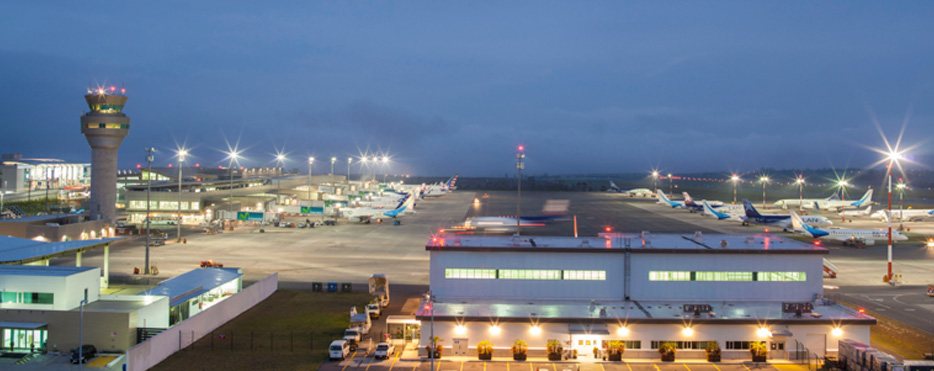
- Received the ASQ Award given by the Airports Council International for the second consecutive year.
- 300 airports from more than 80 countries participated in the ASQ programme.
Quito, March 1st, 2016. Yesterday, the Airports Council International (ACI)—an organization that regulates and represents 1,861 airports in 177 countries—revealed the results of the Airport Service Quality (ASQ) Awards for 2015 (the most prestigious international awards regarding airport services offered to passengers) for the Latin America & Caribbean region. Quito International Airport has achieved second place in this category for the second consecutive year among 18 airports that participated.
ASQ is the main benchmarking programme measuring passengers’ satisfaction with airport services across the globe, with the participation of close to 300 airports in more than 80 countries. In 2015, the results highlight the best airports in a variety of categories.
The ASQ Survey covers 34 key service areas and includes eight major categories, such as access roads, check-in, security, airport facilities, food and beverage providers, commercial offering and much more. All participating airports use the same survey questions. This creates an industry standard set of responses that allows the participating airports to track and analyse their performance as well as benchmark their results against airports across the globe. All participating airports may see the ASQ Survey results for all other participating airports confidentially.
“Airports’ increasing concentration on ensuring a stellar passenger experience is part of a larger trend,” noted Angela Gittens, Director General, ACI World. “Airports have evolved into complex, customer-focused businesses in their own right that in many cases are in competition with each other for passenger traffic. From duty free and restaurants to ambience, cleanliness, courtesy of staff, amenities, efficiency and more, air travelers are expecting big things from the airports through which they travel. More than anything, ASQ is a way for participants to measure the extent to which they deliver on these expectations.”
Andrew O’Brian, President and Director General of Corporación Quiport, concessionaire of Quito International Airport, noted that “the recognition given by ACI is a source of satisfaction and pride. However, at the same time, it commits us to continue searching for opportunities to improve our service since it allows us to carry out a comparative study of our weaknesses and strengths in relation to other airports on a global scale, with an emphasis on terminals with similar characteristics to our own.”
JETBLUE HAS STARTED ITS SERVICE FROM QUITO
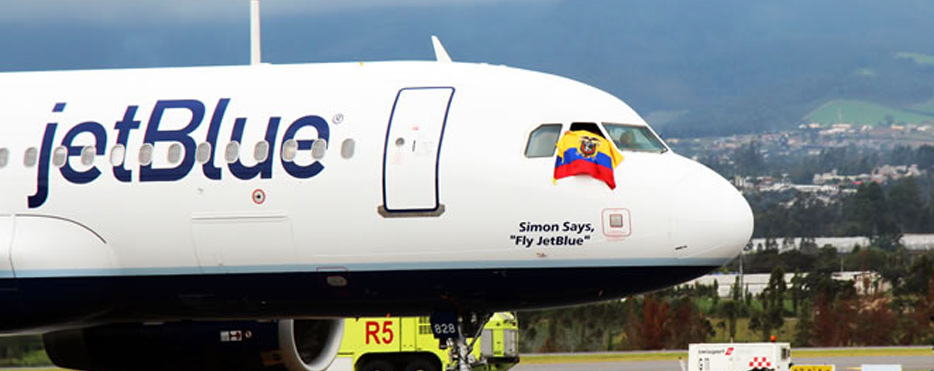
- The expectations are that the addition of the new airline will stimulate the growth of passenger numbers between Quito and Florida by 40%.
- The route, including seven flights a week, will be served by its Airbus 320 aircraft with a capacity for 150 passengers.
- This milestone is a demonstration of the growing importance of Quito and its airport as a premier destination on a regional scale.
Quito, 25 February 2016. This afternoon marked the arrival at Mariscal Sucre International Airport of the inaugural JetBlue flight joining the city of Quito to the city of Fort Lauderdale in the United States.
Upon its arrival at the capital´s airport, the airline´s Airbus 320 was received with a water arch salute from two fire engines of the airport´s Fire and Rescue Service, a traditional welcome in the aviation industry on important occasions. The addition of JetBlue to the roster of airlines at the Mariscal Sucre Airport is a sign of the growing importance of Quito as a premier tourism destination on a regional scale.
The International Quito Airport is the main entry point to Ecuador. Thanks to its technical characteristics, the airport has allowed a significant increase in connectivity for Quito and the country, at the same time offering more efficient operations for airlines and an excellent service for passengers.
Andrew O’Brian, President and Director General of Corporación Quiport (concessionaire of Mariscal Sucre Airport) explained that “the entry of this type of airline to the Ecuadorian market is very important as it is a stimulus for the market of this particular route. Currently around 180,000 passengers travel from Quito to Florida per year and we hope that this stimulus will see numbers on this route grow by 40%”.
At a special ceremony held at Mariscal Sucre Airport to mark the start of JetBlue´s service, Catalina Bretón, the company´s Commercial and International Planning Director, stated that “with this new route we expect the seat occupancy on flights to Fort Lauderdale to be similar to the occupancy rate throughout our network of routes, at around 85%, and given that we will offer a daily flight on single cabin 150-seat aircraft, we expect to transport approximately 93,000 passengers during the first year of operations”.
Andrew O’Brian emphasized that “the start of operations by JetBlue in Quito is an important milestone for connectivity between Ecuador and the United States. It is the result of intense work carried out over a period of more than two years”. He thanked JetBlue for its trust in choosing Corporación Quiport as its strategic partner in Ecuador and choosing Mariscal Sucre Airport for its operations.
For her part, Catalina Bretón expressed her satisfaction in bringing the “JetBlue Experience” to Ecuador. “We have shown that through our unique business model which combines low fares with high quality service, we have been successful not only in the United States but in Latin America and the Caribbean”.
The arrival of JetBlue is expected to have a positive impact on tourism from the United States and will provide Ecuadorian passengers with a greater offer of destinations from Fort Lauderdale since this airport acts as a connection hub from which JetBlue currently offers non-stop flights to more than 40 destinations, boosting connectivity to and from Quito.
